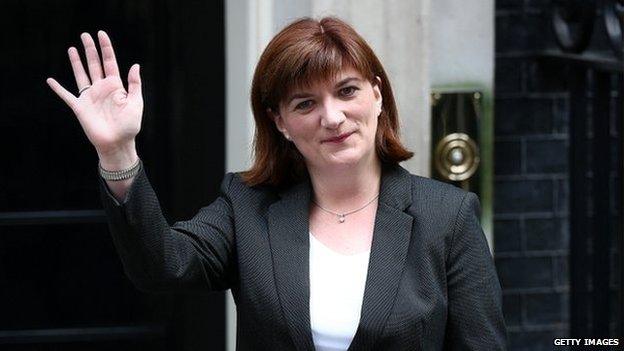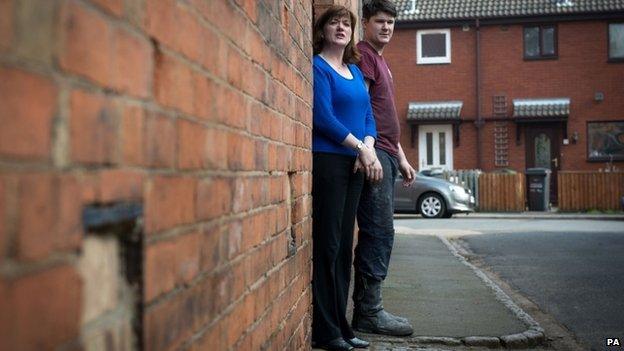Nicky Morgan: Olive branches or burning bridges?
- Published

Nicky Morgan can now stamp her own identity as education secretary
When Nicky Morgan became education secretary last year her biggest strength and biggest problem were the same thing - not being Michael Gove.
Her predecessor had cast a long shadow, having dominated the education landscape and in many ways re-made it in his own likeness.
Mrs Morgan was introduced as a less confrontational figure, offering an olive branch to a teaching profession that had felt that it was being used for target practice.
But many of the questions she faced were about how she defined herself against the Gove legacy, rather than about her own vision.
Now she is back under her own steam, authority enhanced and able to stamp her own identity on the Department for Education.
'Coasting' schools
So what will be the direction of schools in England under Mrs Morgan? Will it be more olive branches? Or will it be more burning bridges?
The first education bill of the new Parliament promises to create hundreds of academies and free schools, with plans to replace the leadership of schools that are struggling. So no surprises there, it's going to be more of the same.
And it will raise the same questions about whether structural change really raises standards.

Nicky Morgan increased her majority in Loughborough at the general election
But so much of this debate is about the rhetoric rather than the reality - and head teachers have been bristling at the language of threats to send in teams of new leaders to "failing and coasting schools".
Heads' leaders have been irritated that the public discourse is already so negative.
And they ask where are all these armies of superstar replacement heads waiting to be "parachuted" into schools?
The "coasting school" motif really irritates them, not least because it's such a vague term, leaving many heads unsure whether they should be looking over their shoulder.
Balancing act
But maybe they should see it as part of the cycle of government.
"Hundreds of schools in England which are considered to be 'coasting' are facing a government crackdown, external." This was a story from 2007, with an almost identical threat of such lacklustre schools being taken over.

Preparing the next stage: Nicky Morgan and David Cameron on the campaign trail
And it wasn't even new then.
"The school standards watchdog in England is to crack down on 'coasting' schools, external". That was from 1999 - and it annoyed head teachers then too.
It's also worth noting that Ofsted at the same time announced that schools would only receive from six to 10 working weeks' notice of an inspection, instead of two terms. It's now less than one day's notice.
And schools are still "coasting".
Less is more
One of the balancing acts for Mrs Morgan will be how to keep school leaders on board, as serious professional partners, when at the same time the political language about education often reverts into accusations and threats.
Heads say they are facing big practical pressures in the next five years - hundreds of thousands of extra pupils needing places, fears of a shortage of teachers and head teachers, and worries about over-stretched budgets.
Constantly talking about academies seems an ideological sideshow to them.
And the engagement of heads will be crucial in what is going to be a major task for the next five years - rolling out the curriculum and qualifications reforms announced under the previous coalition government.
There are bound to be some unforeseen bumps, and downright craters, in this delivery phase.
Mrs Morgan has promised that the next five years will see an end to "constant change". There was a strong message to teachers during the election campaign that there would be more bedding in and less uprooting.
And that means finding a way to avoid any more headline-grabbing changes, without looking like this is an administration that is becalmed. She'll have to show that less is more.
But there are still questions to be decided which will be seen as symbolic. Not least about whether to allow a Kent grammar school to open a satellite branch in another town.
Speaking privately, heads' leaders say there seems to be a balancing act.
Mrs Morgan is described as being much more accessible and wanting a better relationship with the teaching profession - and the atmosphere in the Department for Education is described as "completely different" than in the Gove era.
They describe ministers as being "very upbeat".
But head teachers still bridle at what seems to be a very different political tone, that they criticise as negative towards schools, lacking in evidence and counter-productive.
Good cop, bad cop? Mrs Morgan now has the chance to establish her own classroom style.